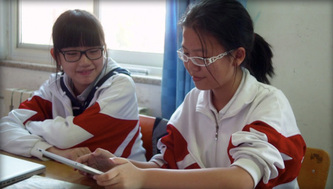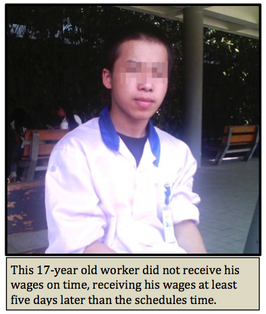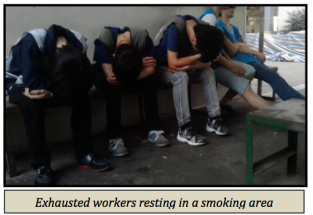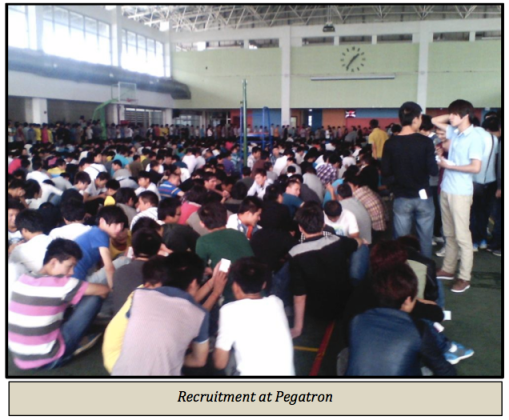|
Originally posted on 21 Century Nomad  Students use an iPad in the classroom. From Apple's website. Students use an iPad in the classroom. From Apple's website.
Apple has long considered itself a renegade, a breaker of conventions, and a change-maker, and education has been a realm in which it seeks to have a revolutionary impact. Apple is well-known for its long-standing presence in classrooms, and its executives maintain, “Education is in our DNA.”
Apple is proud of its relationships with schools, as shown by the company’s robust education section of their website. While researching Apple’s education customers for my previous post, “The Top 10 Things You Didn’t Know About Apple,” one customer profile, which includes a short film, caught my attention. The “Apple in Education Profile” of Renda Fuzhong (RDFZ) Xishan in Beijing, China, explains that a revolution in education is underway in the country, thanks in part to use of Apple’s MacBook Pro and iPad in the school’s 7-9th grade classrooms. Breaking from what is described as the dysfunctional Chinese educational model focused on “core knowledge” and “rigorous testing,” with the help of Apple products the school has implemented a successful new model that promotes “personal growth, creativity, and innovation.” The description of the school’s “experimental” model of education resonates with contemporary American values and trends present in Apple’s marketing. In my study with Gabriela Hybel of over 200 Apple commercials that have aired in the US since 1984, we found that one of the key themes that courses through them is that Apple products allow their users to cultivate and express intellectual and artistic creativity. The video profile below of the school and its program resonates with this theme, and provides an inspiring take on the what Apple means to the youth of China (Note: Please watch the video! Doing so will allow you to see for yourself the great contrast in how students from different backgrounds experience Apple). As I read the profile of RDFZ and watched the video about the school, I couldn’t help but think that this did not seem to be an accurate depiction of what Apple means to the youth of China. While I certainly think it is great for these students that they are receiving a top-notch and technologically innovative education, a little research revealed that RDFZ Xishan is considered the most prestigious school in Beijing. While it is described by Apple as a public school, it is the sister school of Phillips Academy in Massachusetts and Phillips Exeter Academy in New Hampshire–both exclusive private schools. The middle school is a part of the RDFZ high school, which funnels students to the most elite universities in China, the UK, and the US. It is also a part of the G20 Schools, a collection of elite and mostly private secondary schools around the world. In short, this school serves the children of Beijing’s wealthy elite–a minuscule portion of China’s youth. When we think about what Apple means to the youth of China, we have to consider not only the privileged few who might benefit from using the company’s products in the classroom, but the hundreds of thousands of young workers assembling Apple products in factories throughout the country. Their experience of Apple is vastly different from that of the students of RDFZ Xishan. A recent report from China Labor Watch, which details numerous violations of Chinese labor laws and the employment of minors at Apple suppliers, makes this fact shockingly clear.
This video, published on China Labor Watch’s YouTube channel, showcases labor violations at three Pegatron facilities in China: Pegatron Shanghai where the “cheap” iPhone is in production; Riteng Shanghai, a Pegatron subsidiary where Apple computers are assembled; and AVY Suzhou, another subsidiary of Pegatron that is producing parts for the iPad. China Labor Watch sent “undercover investigators” into these facilities and ultimately identified 36 violations of labor laws, including regular and forced overtime (far over China’s legal limit of a total of 49 hours per week), regular unpaid labor of up to 14 hours per week, lack of safety training, and having to stand for over 11 hours at a time.
Importantly, they found about 10,000 underage and student workers employed across the three sites, comprising nearly 15 percent of the total labor force of 70,000. While China labor law stipulates that workers under the age of 18 must be provided certain protections not afforded adult workers, the researchers found that underage workers experienced the same treatment as all other workers, including staying in over-crowded dormitories with 8-12 people per room, and having limited access to the few group showers for hundreds of people.
The report from China Labor Watch points out that Apple claims in its Supplier Responsibility Reports that it does not tolerate these legal violations at its suppliers, and that it has corrected most of them throughout its supply base. For instance, Apple claims, “We don’t tolerate underage labor. Our code requires our suppliers to provide special treatment to juvenile workers.” The report from China Labor Watch points out that Apple claims in its Supplier Responsibility Reports that it does not tolerate these legal violations at its suppliers, and that it has corrected most of them throughout its supply base. For instance, Apple claims, “We don’t tolerate underage labor. Our code requires our suppliers to provide special treatment to juvenile workers.”  Published in CLW’s July 29, 2013 report. Published in CLW’s July 29, 2013 report.
However, the CLW researchers found this to be overwhelmingly untrue. Further, they found that many underage workers are student “interns” forced to work by their schools, they receive lower pay than the average worker because of this, and often have to pay the school and their teachers fees for the “opportunity.” The report also notes, “Many students are required to work at the factories despite the production work being unrelated to their studies. For example, a Gansu student at Pegatron studying early education was required to work on the production line.”
Through my research with Tara Krishna into Apple’s Chinese supply chain I have found that the problem of student interns is not particular to these Pegatron sites, but is a systemic problem in China that has been folded into Apple’s supply chain and profit structure. While this has not been covered by mainstream media outlets in the US, Chinese media and scholars have been reporting on the problem for years, particularly at Foxconn facilities. Sociologists Pun and Chan report China’s pro-growth economic policy pressures heads of schools to funnel students into low-wage “internships”. Xiaotian Ma, in a piece titled “Interns Behind the iPhone 5” for China’s Southern People Weekly wrote that some schools threaten to withhold degrees from college students who leave their internships (Note: This story was downloaded from the internet by my Chinese research assistant but is no longer available online. I will happily forward a digital copy to anyone who wishes to read it.). A report from Shanghai Daily cited on CNet in September 2012 states that students from universities were driven to and forced to work in exploitative conditions at a Foxconn factory producing iPhones because the site was experiencing a labor shortage just before the release of the iPhone 5.  Published in CLW’s July 29, 2013 report. Published in CLW’s July 29, 2013 report.
Of course, Apple is hardly the only company working with suppliers who use underage and forced labor. Foxconn sites producing Nintendo gaming consoles have been found to have workers younger than 16 years old. Given documentation of extensive labor violations throughout the technology sector in China, it stands to reason that this is a systemic problem. In 2000 child laborers were estimated by the International Labour Organization to make up as much as 20 percent of China’s labor force. Most feel compelled to leave school and work because their families live in poverty.
Further, this problem extends beyond factory walls into the social fabric of Chinese society. For the majority of China’s youth Apple and other booming tech companies do not signal a heightened educational experience nor an economic boom, but rather the scattering of communities and closure of rural schools as residents of villages are driven off by the construction of new factories, and the neglect and desperate solitude of China’s 60 million “left-behind kids” whose parents have left villages for work in urban production zones. The principle of RDFZ Xishan is right when he says in the celebratory video hosted on Apple’s education website, “The future is something we create.” For the wealthy, privileged students at the prestigious school, Apple products are no doubt helping to create a future of high social status and economic security. But, for the majority of China’s youth, whether underage workers, student “interns”, left-behind children, or kids whose rural communities have been displaced for factory development, the future that we are collectively creating for them through our consumption of these products is a bleak one. Apple can do better, and so can we as a global society. Nicki Lisa Cole, PhD Nicki Lisa Cole, PhD is a lecturer in sociology at Pomona College in Claremont, CA. A committed public sociologist, Nicki studies the connections between consumer culture and labor and environmental issues in global supply chains. You can read more of her writing at her blog, 21 Century Nomad, and learn more about her research and academic work at her website. Comments are closed.
|
.
.
Tags
All
|

 RSS Feed
RSS Feed